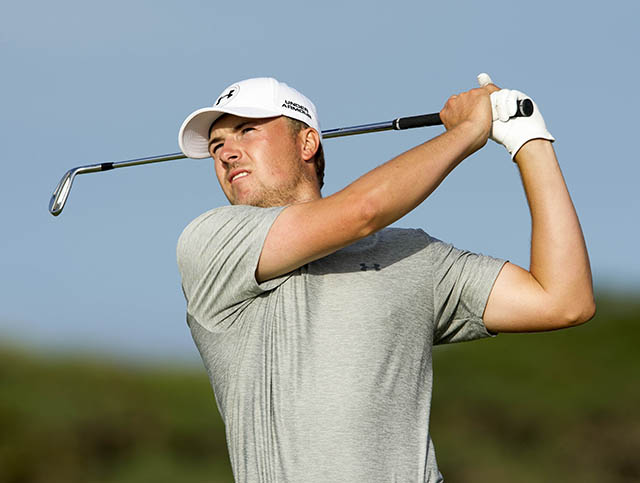NEWS
Oddities at Open could affect Spieth's pursuit of Grand Slam

ST. ANDREWS, Scotland -- Something has to go wrong for Jordan Spieth at the British Open because it always does.
That was the case for Arnold Palmer when he was on the wrong end of history at St. Andrews in 1960. And for Jack Nicklaus, who could only wish he had packed his own pillow along with his golf clubs on the way to Muirfield in 1972. And for Tiger Woods, whose fiercest opponent in 2002 turned out to be Mother Nature.
Even the greatest players in pursuit of a Grand Slam need more than sheer talent.
"You need luck," Ernie Els said Tuesday. "You need bad luck from other people to go your way, and you need your own luck to go your way."
Even though Spieth is the odds-on favorite this week at St. Andrews, odds are against him as he goes after the third leg of the Grand Slam. The first indicator is that no one has ever done this since Palmer came up with the concept of a modern Grand Slam in 1960.
And the three players who tried happen to be the three biggest names in golf over the last half-century.
But it's more than a ball that bounces left into a pot bunker instead of right onto the green, or a putt that lips out instead of lips in.
The mystique of the "Arnie charge" came to life in 1960 when he became the first player to birdie the last two holes to win the Masters by one shot, and then famously rallied from a seven-shot deficit in the final round of the U.S. Open at Cherry Hills when he drove the first green and closed with a 65.
And he was headed that direction at St. Andrews.
Palmer started slowly with rounds of 70-71 and trailed Roberto de Vicenzo by seven shots going into the 36-hole final on Friday. A 70 in the morning pulled him within four shots, but Palmer had momentum on his side and was convinced he was going to win the claret jug.
And then it started to rain, which certainly is not unusual in Scotland and is never enough to keep from playing.
Except this time.
The final round was washed out until Saturday, and Palmer felt he lost his advantage. He still thinks the rainout cost him the Open — and a shot at the Grand Slam — and he was particularly clear on his point during an interview with Ian O'Connor for the book, "Arnie & Jack." O'Connor never even had a chance to finish the question.
OF COURSE: Open Championship tee times
"Yes! The answer to your question is, "Yes.' You don't think I know what the question is, do you?" Palmer told him. "I was looking out the window of the Russacks Hotel and I saw the rain coming, and my wife and father were there with me and I said, 'Don't worry, They never stop the Open. They will play.'
"I was never thinking they were going to stop it, and they did," he said. "And that was the end of the story."
Kel Nagle won by one shot.
Nicklaus might have been the most overwhelming favorite ever in a Grand Slam bid. He never trailed after any round in winning the Masters and U.S. Open, and the British Open was at Muirfield in 1972, where Nicklaus had won his first claret jug six years earlier.
But the Golden Bear woke up Monday with a stiff neck, which restricted his swing. He went around Muirfield with caution and did well enough to keep within a shot of Tony Jacklin and Lee Trevino until Trevino pulled away in the third round and built a five-shot lead. The neck finally loosened up for Nicklaus in the final round, and he fired off a 66 that wound up one stroke short of Trevino.
Nicklaus wrote in his 1997 autobiography, "The frustration and disappointment were more intense than I care to remember, even now, a quarter of a century later."
A year later, he began taking his own pillow on the road.
TAKE YOUR PIC: Tuesday photos from the Open Championship
Woods won by three shots at the Masters and the U.S. Open, and he was two shots out of the lead going into the weekend when a black cloud over the Firth of Forth spelled doom. It rained hard enough to flood the course, except the wind was blowing so hard the water didn't gather. Temperatures plunged into the 40s.
"The hardest conditions I've ever played in," Woods said.
And it produced his highest score at the time — 81 — that wiped out his shot at the Grand Slam. His score cannot be attributed entirely to bad weather because Thomas Levet played in the group behind Woods that day and shot 74, and the Frenchman wound up in a four-man playoff that Els won. Even so, Woods was rarely at his best in nasty weather, and he still looks back on that Black Saturday as what stopped his slam.
So what can Spieth expect?
The usual suspect is the weather, and this week it looks to be a little bit of everything. Players should know they could be in for a tough week when part of the forecast for Friday includes this line: "Winds will be quite complicated."
"Saturday there is a gale-force wind. Ask him how is wind game is," Els said, pausing before he added, "He should be good. He's a Texan."
